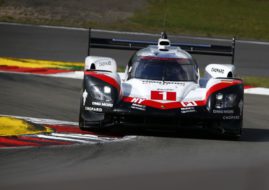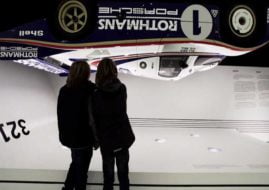Porsche 956 - Fastest Ever Car at Legendary Nürburgring Nordschelife
Porsche 956 is a prototype car and was used by Porsche factory team and other private teams in the World Endurance Championship and other competitions, including 24h Le Mans, between 1982 and 1986. The car claimed its first Le Mans victory in debut appearance in 1982, clinching three more wins from 1983 to 1985. Porsche 956 was also the winning car for four consecutive years (1982-1985) in the World Endurance Championship.
Besides many glorious victories all over the world, Porsche 956 is remembered as a car that set a lap record at the legendary Nürburgring Nordschleife race track.

Porsche 956 was introduced in 1982, together with new Group C regulations
The Porsche 956 came as a replacement for 936
The Porsche 956 was built, as a replacement of the successful Porsche 936. The project started in the Summer of 1981 when FIA announced new Group C regulations for sports car racing. The first prototype chassis was completed in Spring 1982 when the World Endurance Championship season started.
The 956 features a chassis made of an aluminum monocoque and that was a first chassis made of aluminum for Porsche. It helped the car to meet the 800 kg weight minimum. The engine was the same as in the previously used prototype Porsche 936/81. It was the Type-935 2.65L turbocharged Flat-6 engine,that produced about 635 hp. Porsche used the dual clutch gearbox (PDK – Porsche Doppelkupplungsgetriebe) for the first time.

Aerodynamics package allowed speed over 360 kmh
Exceptional ground effect aerodynamics of a new car
The 956 was also the first Porsche that has ground effect aerodynamics. It produced over three times as much downforce as the older model Porsche 917 that raced over a decade. The car was designed by Norbert Singer, who was involved in the development of all Le Mans-winning Porsche cars between 1970 and 1998.
The Porsche 956 features two different rear wing designs. For most events, the cars were fitted with a larger, high downforce rear wing. For the Circuit de la Sarthe, where a top speed on the almost Mulsanne Straight was essential, the car was fitted with a much lower and smaller ‘low drag’ wing to enable speeds over 360 km/h.
During its lifetime, the Porsche 956 underwent some changes, such as an improved chassis with better fuel efficiency for the 1984 season.That car was named 956B. In total, Porsche built 28 cars from 1982 to 1984. The 29th chassis was built from spare parts by Richard Lloyd Racing.

1-2-3 victory at Le Mans debut in 1982
The 956 was a third Le Mans winning car for Derek Bell and Jacky Ickx
The Porsche 956 made its competitive debut at the 6 hours of Silverstone in May 1982, the second round of the World Endurance Championship, with Jacky Ickx and Derek Bell driving the #1 car. They finished second, behind Michele Alboreto and Riccardo Patrese in the Group 6-spec Lancia LC1.
After missing the following round at the Nürburgring to allow further development of a car, Ickx and Bell decided to reunite at the 24 Hours of Le Mans in June. They took their third overall win together. It was a 1-2-3 victory for Porsche, #2 car finished second (Jochen Mass, Vern Schuppan) and #3 was in the third place (Hurley Haywood, Al Holbert, Jurgen Barth).
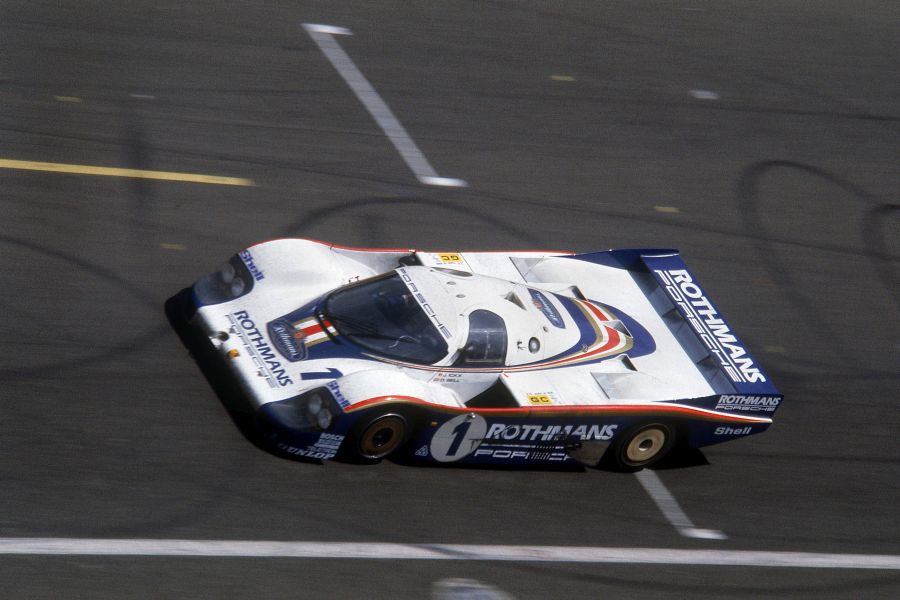
Porsche 956 earned four world championship titles for the German manufacturer
Two world championship titles for Ickx with Porsche 956
Ickx/Bell scored three more wins later in the season (Spa, Fuji, Brands Hatch), securing both drivers’ title for Jacky Ickx and manufacturers’ title for Porsche.
Boosted by the success of a new car, Porsche sold many cars to customer teams such as Joest Racing, Obermaier Racing, John Fitzpatrick Racing, Richard Lloyd Racing, Kremer Racing and Brun Motorsport. In the next couple of years, those teams added many wins and titles to 956’s account.
In 1983, Porsche 956 was a winning car in all seven races of the World Endurance Championship. The car that was victorious was the #2 of Derek Bell and Stefan Bellof, but Jacky Ickx took one more drivers’ championship title.
Belloff set the fastest ever lap at Nordschleife
In the third round of the championship, at the legendary 20-km long Nürburgring Nordschleife circuit, Stefan Bellof set the fastest lap time ever, the record that was valid until 2018 when Timo Bernhard set a new record in a Porsche 919 Hybrid Evo.
During the qualifying session, Bellof drove his 956 around in 6 minutes 11.13 seconds, at an average speed of 202 km/h. Bellof also broke the race lap record, with the lap time 6:25.91.
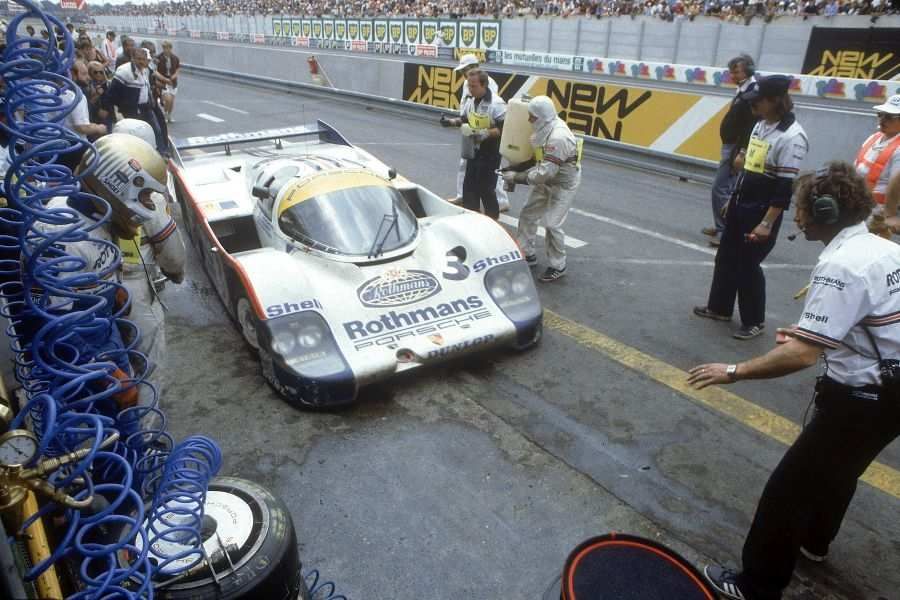
1983 Le Mans winning car
Vern Schuppan’s victorious car at Le Mans and Japan
Since the Porsche 956 was a totally dominant car in the championship, the same situation happened at 1983 Le Mans 24-hour race. Porsche drivers occupied not only all podium spots but at the same time, Porsche 956 took the first eight places. The winners were Vern Schuppan, Hurley Haywood and Al Holbert in the #3 Rothmans Porsche. The podium was completed by a crew Ickx/Bell and Mario Andretti/Michael Andretti/Philippe Alliot.
The Porsche 956 was a title-winning car in the 1983 All-Japan Sports Prototype Championship. The Le Mans winner Vern Schuppan was the Japanese champion who won two races in the #1 Trust Racing’s Porsche 956.

Joest Racing’s victorious car at 1984 Le Mans 24h
956 dominated at 1984 Le Mans despite factory’s boycott
In 1984, Porsche’s domination continued, with 10 wins in 11 races. The German manufacturer lost only a race at Kyalami Circuit. That race was won by Martini Racing’s Lancia LC2. Stefan Bellof took the world’s drivers’ title, driving for two teams (Rothmans Porsche and Brun Motorsport).
At the 1984 24 hours of Le Mans, Rothmans Porsche team boycotted the race due to a disagreement between Porsche and the Automobile Club de l’Ouest (ACO) over the fuel regulations. Despite that, Porsche 956 clinched seven top positions with private teams. The winning car was the #7 New-Man Joest Racing‘s Porsche 956B, driven by Henri Pescarolo and Klaus Ludwig. Only Vern Schuppan was competing of all factory drivers, finishing sixth in the Kremer Racing’s car.
In 1984 All Japan Sports Prototype Championship, the Porsche 956 was a winning car in three out of four races, but with different teams, so the title went to the Japanese drivers in the M1C-BMW prototype.

Stefan Bellof lost his life in the #19 Brun Motorsport’s car
World champion Stefan Bellof lost his life in Porsche 956
In 1985, Porsche was combining 956B and 962C cars, taking one more world’s title. Porsche won eight out of ten races, three of them with an old 956 car – Circuit de la Sarthe, Hockenheim and Mosport. Rothmans Porsche team returned to LeMans 24h in 1985, but Joest Racing took its second win in a row, with Klaus Ludwig, Paolo Barilla and John Winter in the #7 New-Man Porsche 956B.
On September 1, 1985, at Spa-Francorchamps, the tragedy struck not only Porsche but the motorsport world when Stefan Bellof lost his life in a collision with Jacky Ickx. Bellof was driving #19 Porsche 956B for Brun Motorsport while Ickx was in the factory-entered #1 Porsche 962C. That tragedy accelerated Porsche’s conversion from 956 to a safer 962C model.
In Japan, Porsche customer teams were combining 956B and 962C cars during 1985 and 1986. Vern Schuppan scored one win for Trust Racing’s 956B, finishing second in the 1985 classification. In 1986, the 956 was victorious in four Japanese races but the title again went to a driver with a new 962C car.
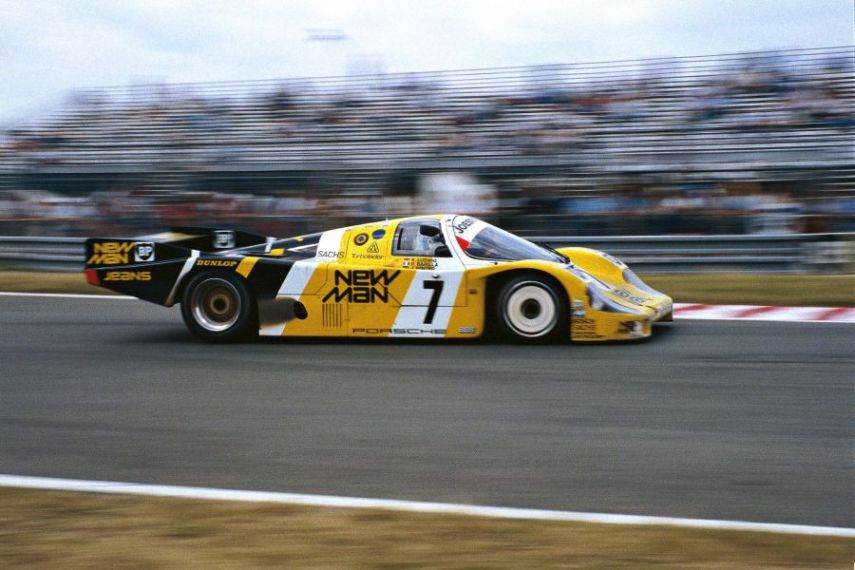
Joest Racing scored two Le Mans wins with Porsche 956
Two very last wins for 956 at Fuji Speedway
During the 1986 FIA World Sports Prototype Championship, few private teams were using the 956, scoring three last wins for the car and one final podium at Le Mans. Joest Racing’s #8 car finished third at Le Mans, behind two 962Cs. Richard Lloyd Racing’s Bob Wollek and Mauro Baldi won at Brands Hatch while Joest Racing’s #7 car won two races. Klaus Ludwig was a winner at Norisring, Paolo Barilla and Piercarlo Ghinzani won at Fuji in October.
That victory at Fuji Speedway was the last victory for Porsche 956 in the World Championship, but the very last win came on November 23 in the Japanese championship, again at Fuji. The very last winners in the Porsche 956 were Vern Schuppan and Keiichi Suzuki.
The season of 1986 was the last competitive year for this legendary car. The era of Porsche 962 already began and Porsche continued its domination in the world’s prototype racing.
Photos: presse.porsche.de,



